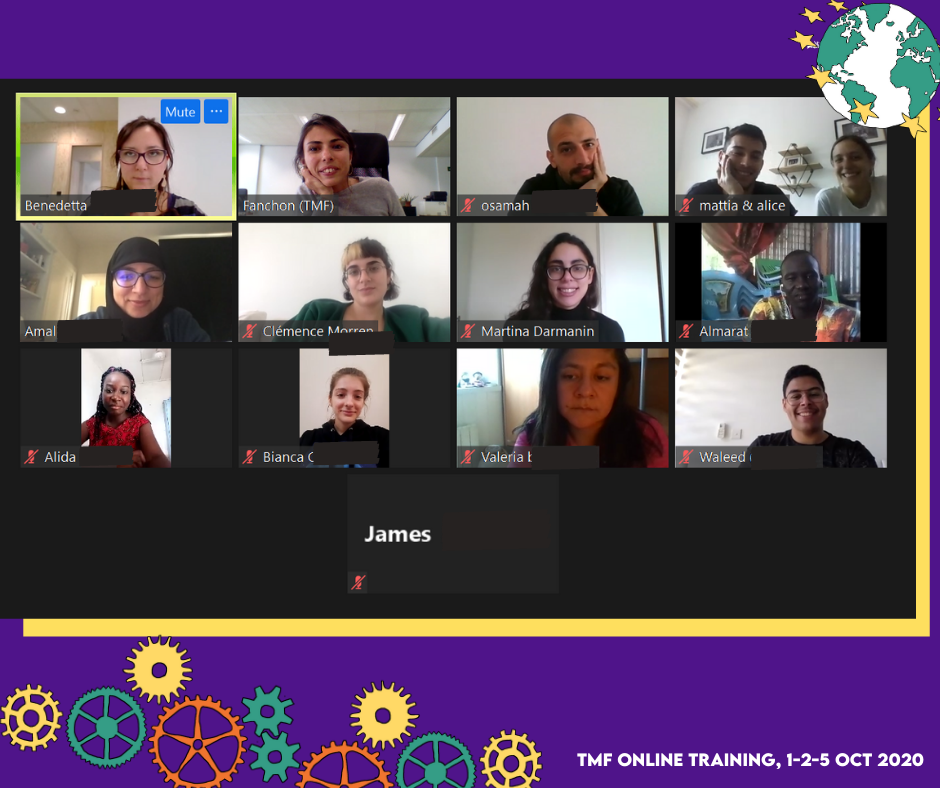Due to the Covid-19 pandemic, the [TMF] programme had to adapt its plan … to also move online for its annual capacity building event! The objective of the event was to support students, young people and youth-led organisations interesting in applying to the TMF funding programme.
Over three days, the group composed of 13-15 people based in Europe, Africa and Middle East exchanged knowledge and experience, but also barriers and fears. Amal Hamich, youth trainer and facilitator, was supporting the discussions, by bringing new perspectives and more theoretical and practical elements needed when developing grassroots projects!
You could not join the event? Here are the main point we discussed in order to develop a meaningful project on social inclusion of young people with refugee background
SOCIAL INCLUSION:
- Why do we prefer to talk about “social inclusion” rather than “integration”? Inclusion is a two-way process where the host society and institutions adapt to diversity, ways of life and identities. Opportunities and resources are distributed to limit marginalisation.
- Importance of the concept of “intersectionality”: we all have several identities (gender, origin, race, age, status, etc). When we run projects, limiting exclusion and marginalisation is crucial. For that, it is important to look at all identities at the same time to provide the most inclusive solutions. For example, if we organise a workshop on access to University, the needs of a young woman who came to Europe alone, without any diploma will not be the same ones as a young person who came with his family, are living together and already got his previous diploma recognised; and vice versa.
“There is not such thing as a single-issue struggle live single-issue lives” – Audre Lorde.
- The Ladder of participation is a perfect tool we can use to understand, step by step, the main levels of participation & inclusion of the target group in a project or an organisation. In TMF we are talking about young people or university students with refugee or migrant backgrounds. The higher we go, the better is the participation of the target group. Let’s forget manipulation, tokenism and simple information; let’s go for real consultation, shared decision-making processes or initiative led by students with refugee backgrounds!

SOCIAL ECONOMY AND LEADERSHIP SKILLS:
- What type of leader am I? When we are talking about “leadership” we are talking about the art of motivating a group of people toward achieving a common goal. It’s the art of inspiring and motivating action, a can-do personality. According to Goleman, there are 6 Leaderships styles: the Visionary, the Affiliative, the Coach, the Democratic, the Pacesetting and the Commanding. Check the type of leader you are!
- When we talk about “social economy” we are talking about an economic system where benefits goes to the community. It brings positive impact on people and the environment. However, as always, let’s not forget to always involve the target group in the discussions, when we want to start such a project!
PROJECT MANAGEMENT: the good news is: we can all apply for funding and run projects. However, some aspects need a special attention to ensure a good project, from A to Z!
- Start identifying the needs and the problems of the target group. Work with your people, involve them actively in the internal discussions to make sure your project will answer concrete problems.
- Develop realistic activities answering the identified problems (in terms of time, human resources, budget available).
- Support the problems and activities with data, facts and figures (survey, number of participants, reports, etc), to help the evaluators to understand!
- Sustainability of the project is not the first criteria, however it’s always good to show that you have plan for “after”. So the project will not disappear 🙂
- Budget: should be realistic. Do not forget that some organisations and institutions often propose some services and room for free!
- English language and writing skills are not part of the selection criteria: simple English and short sentences will help the evaluators to understand your ideas!
- Don’t forget to ask someone outside of the team to re-read the application to make sure everything is clear!
- In case it was not clear before: involve your target group at each and every stage of your project! Creation, implementation, evaluation.
“Insightful and Inspiring: the TMF’s capacity building seminars bring students and people of all different backgrounds in interactive workshops to design campaigns and actions to break barriers preventing the inclusion of people with migrant and refugee background in society and in education” – Martina Darmanin, ESU Human Rights Coordinator




